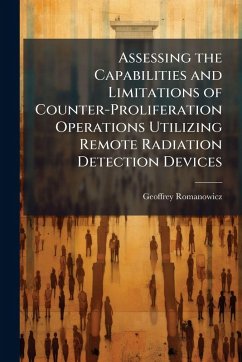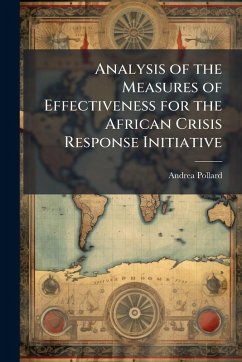
An Examination of the Proliferation Security Initiative and the Role of NATO and the EU
Versandkostenfrei!
Versandfertig in über 4 Wochen
15,99 €
inkl. MwSt.

PAYBACK Punkte
8 °P sammeln!
Announced in 2003, the Proliferation Security Initiative (PSI) represents an effort by the U.S. to assemble a global response to the threat posed by the proliferation of weapons of mass destruction (WMD) and related materials. This paper first describes the defining characteristics of the PSI, to include the international security context in which it was introduced. Next, the progress achieved by the initiative is examined, mainly the interdiction of a shipment of WMD-related parts to Libya, exercises to enhance the program's operational reach, and boarding agreements with important flag state...
Announced in 2003, the Proliferation Security Initiative (PSI) represents an effort by the U.S. to assemble a global response to the threat posed by the proliferation of weapons of mass destruction (WMD) and related materials. This paper first describes the defining characteristics of the PSI, to include the international security context in which it was introduced. Next, the progress achieved by the initiative is examined, mainly the interdiction of a shipment of WMD-related parts to Libya, exercises to enhance the program's operational reach, and boarding agreements with important flag states. The interdiction of merchant vessel SO SAN, which pre-dated PSI, is included due its influence on the program and the insights it offers. Building upon those discussions, the paper highlights some of the challenges that must be addressed for the initiative to realize its full potential, namely the need for penetrating intelligence into proliferation activity and the legal considerations that can limit action in international waters. Recent and ongoing maritime operations conducted by NATO and the European Union (EU) are described thereafter due to their relevance to the PSI. The paper concludes with analysis of the ways in which NATO and the EU can contribute to the PSI if, as institutions, they make the political decision to do so. This work has been selected by scholars as being culturally important, and is part of the knowledge base of civilization as we know it. This work was reproduced from the original artifact, and remains as true to the original work as possible. Therefore, you will see the original copyright references, library stamps (as most of these works have been housed in our most important libraries around the world), and other notations in the work. This work is in the public domain in the United States of America, and possibly other nations. Within the United States, you may freely copy and distribute this work, as no entity (individual or corporate) has a copyright on the body of the work. As a reproduction of a historical artifact, this work may contain missing or blurred pages, poor pictures, errant marks, etc. Scholars believe, and we concur, that this work is important enough to be preserved, reproduced, and made generally available to the public. We appreciate your support of the preservation process, and thank you for being an important part of keeping this knowledge alive and relevant.












